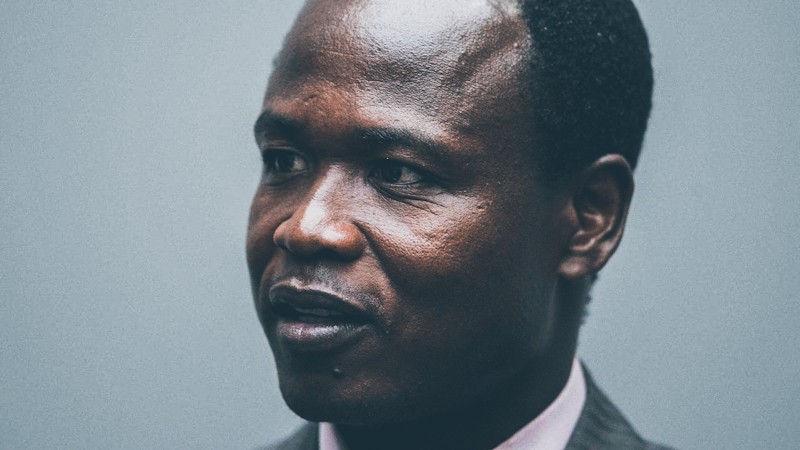Trial Chamber IX of the International Criminal Court on Thursday convicted ex-Ugandan rebel commander Dominic Ongwen of war crimes and crimes against humanity.
A former Ugandan child soldier, Ongwen was found guilty of 61 charges over a reign of terror in the early 2000s, including the first conviction by the ICC for the crime of forced pregnancy.
#ICC Trial Chamber IX finds Dominic #Ongwen guilty of a total of 61 crimes, comprising both crimes against humanity and war crimes, committed in Northern #Uganda between 1 July 2002 and 31 December 2005. pic.twitter.com/9ffb6wfV6H
— Int'l Criminal Court (@IntlCrimCourt) February 4, 2021
“His guilt has been established beyond any reasonable doubt,” Presiding Judge Bertram Schmitt said, naming the victims and describing the crimes. “This case is about crimes committed by Dominic Ongwen as a fully responsible adult as a commander of the LRA in his mid-to-late 20s”.
“The overwhelming evidence paints a picture of Dominic Ongwen as a person in full possession of his mental abilities. His subordinates described him as an extremely capable fighter and commander. He planned his attacks carefully and assessed the risks together with his officers.”
“Let me emphasise that it was difficult for the chamber to ascertain the names of every victim of the 70 crimes. Yet, in many cases, the chamber was able to do so. These victims have a right not to be forgotten; they have the right to be mentioned explicitly today as they are in the judgement as well. Please bear with me if I pronounce names incorrectly,” Judge Schmitt said.
Judge Schmitt is thoughtfully describing the various (horrifying) experiences of victims and survivors, and providing their names, when known. I don't recall this level of sensitivity in previous deliveries of #ICC verdicts. #Ongwen #Uganda #LRA https://t.co/YsjMRfNqG4 pic.twitter.com/AMmpoWZNQq
— 𝗗𝗮𝗻𝘆𝗮 𝗖𝗵𝗮𝗶𝗸𝗲𝗹 (@DanyaChaikel) February 4, 2021
Ongwen was also convicted for the crime of forced pregnancy for atrocities committed against seven women.
“As a result of the sexual and physical violence and the living conditions to which they were submitted, the abducted women and girls suffered severe, barely imaginable physical and mental pain,” Judge Schmitt added.
Both Crimes against humanity and war crimes were committed in Northern Uganda between July 1, 2002, and December 31, 2005.
The Chamber did not find evidence that supported the claim that he suffered from any mental disease or disorder during the period relevant to the charges or that he committed these crimes under duress or under any threats.
*******
ICC Prosecutor Fatou Bensouda hailed the ruling, saying, “It is my sincere hope that this trial and verdict will strengthen the collective resolve of the international community to end impunity for atrocity crimes, including sexual and gender-based crimes and crimes against and affecting children so prevalent in conflicts around the globe. There must be accountability for the perpetrators.”
Elise Keppler, associate director of the International Justice Program at the Human Rights Watch (HRW) said Thursday’s verdict against Ongwen was a landmark moment in achieving justice for victims of the LRA.
“The LRA terrorised the people of northern Uganda and its neighbouring countries for more than two decades. One LRA leader has at last been held to account at the ICC for the terrible abuses victims suffered.”
The Court will impose on Dominic Ongwen the sentence for the crimes of which he has been convicted.
“For this purpose, it will receive submissions on the appropriate sentence by the Prosecutor, the Defence for Dominic Ongwen and the legal representatives of the participating victims,” a statement from the court reads.
The ICC’s founding treaty, the Rome Statute, does not provide for a death penalty; the sentence may be up to 30 years of imprisonment (and under exceptional circumstances life imprisonment) and/or a fine.
Ongwen is the fifth suspect to be convicted for atrocities at the ICC, a court of last resort established in 2002.
__________________
The trial, in this case, opened on 6 December 2016. The Prosecution and the Defence have completed the presentation of their evidence. The Legal Representatives of Victims also called witnesses to appear before the Chamber. On 12 December 2019, the Presiding Judge declared the closure of the submission of evidence in the case. The closing briefs were filed on 24 February 2020. The closing statements took place from 10 to 12 March 2020.
Over the course of 234 hearings, the Office of the ICC Prosecutor, Fatou Bensouda, presented a total of 109 witnesses and experts, the Defence team lead by Krispus Ayena Odongo presented a total of 63 witnesses and experts and 7 witnesses and experts were called by the Legal Representatives of the Victims participating in the proceedings. The judges ensured the respect of the rights guaranteed by the Rome Statute to each of the parties, including the right to question the witnesses.
A total of 4095 victims, represented by their legal counsels Joseph Akwenyu Manoba, and Francisco Cox, as well as Paolina Massidda, respectively, have been granted the right to participate in the proceedings. They have expressed their position on matters heard before the Chamber and were authorised to examine witnesses on specific issues.
The Trial Chamber issued 70 oral decisions, and 506 written decisions during the trial phase of the proceedings. The total case record, consisting of the filings of the parties and participants and the Chamber’s decision, currently includes more than 1760 filings.





1 Comment
Pingback: Ugandan's Dominic Ongwen to Serve 25-year Sentence for War Crimes